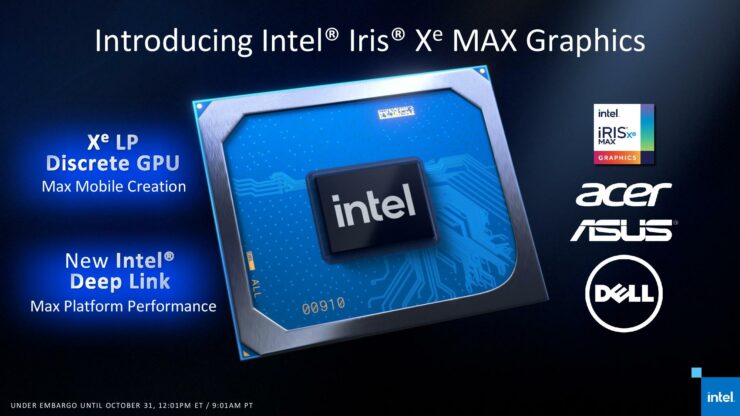
The first third party benchmarks of Intel’s newly launched Xe MAX GPU have leaked out and it is an absolute beast (considering its weight class). Not only does it completely destroy NVIDIA’s entry level MX350 but it trades blows with the MX450 (GTX 1050) and wins in most cases. This is a great result considering this is Intel’s absolute first time building a discrete GPU and combined with Deep Link tech (which offers 7x the performance of a MX350) – it is an incredible value proposition.
Intel Xe MAX GPU third party benchmarks: trades blows with an NVIDIA MX450 (and wins in many cases)
The leak happened courtesy of momomo_us over at Twitter who linked to a video posted on bilibili featuring a small review of an Intel Xe GPU equipped notebook:
The relevant benchmarks and GPUz screenshots are given below for convenience. Here we see that the Intel Xe MAX GPU easily beat out the NVIDIA MX450 at 1826 Time Spy points (the green part usually scores in the 1680 range) and is just slightly behind the MX450 in Fire Strike (green part scores in the 6800 range). Both of these scores are within error of margins so depending on your cooling solutions and TDP environments – these could change. The Xe MAX GPU is clearly a MX450 competitor and offers superior value once you consider that its AI performance beats out an RTX 2080.
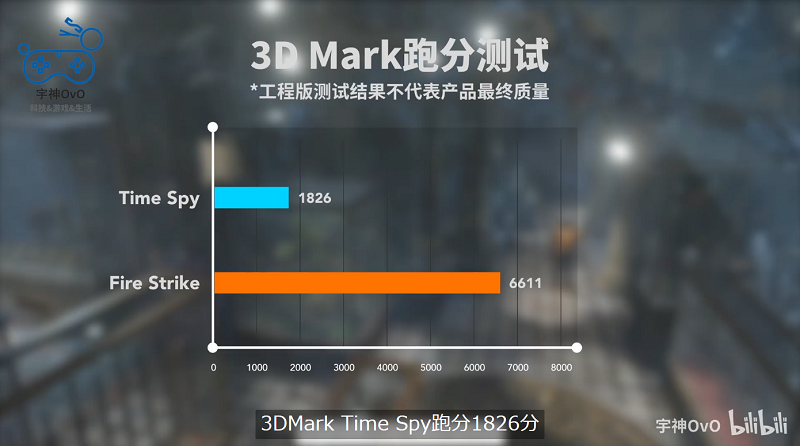
Interestingly, GPU Z was not able to correctly recognize the part – although this is not surprising considering it is a very new launch. Depending on how Intel has been pricing this, they could use this to very quickly break into the discrete GPU market for mobility.
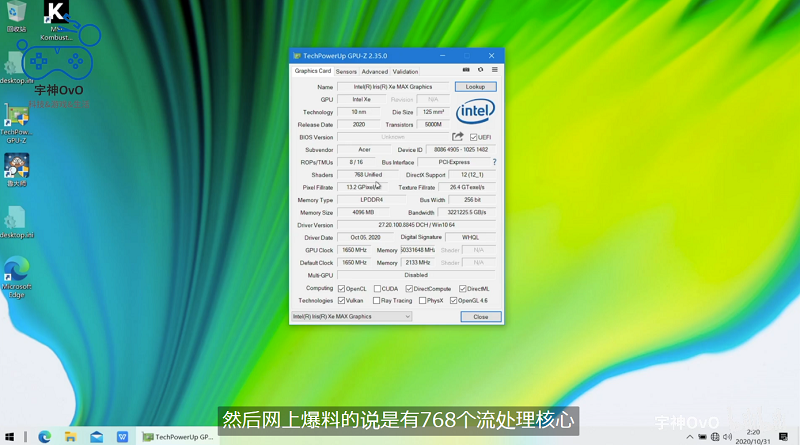
The Intel Iris Xe MAX discrete GPU features the same 96 EUs as its integrated counterpart but unlike the latter, it has a higher TDP envelope that can push the clock speed to 1.65GHz and also contains a dedicated 4GB memory. It features variable-rate shading and Intel DLBoost and works over PCIe 4.0. The core architecture is Intel Xe LP just like its integrated sibling.
Intel Iris Xe (iGPU) and Xe MAX (dGPU) are practically the same GPU so its not surprising that Intel wanted to find a platform technology that would allow them to pool their resources and beat out a competitor. Intel Deep Link is the name of that technology. It is a platform innovation that allows Intel to tap not only the integrated GPU and dedicated GPU together – but also the CPU itself. Compared to cross-vendor configurations (for example NVIDIA-Intel), only one device would run a specific workload.
Intel Iris Xe MAX GPU gaming and AI benchmarks
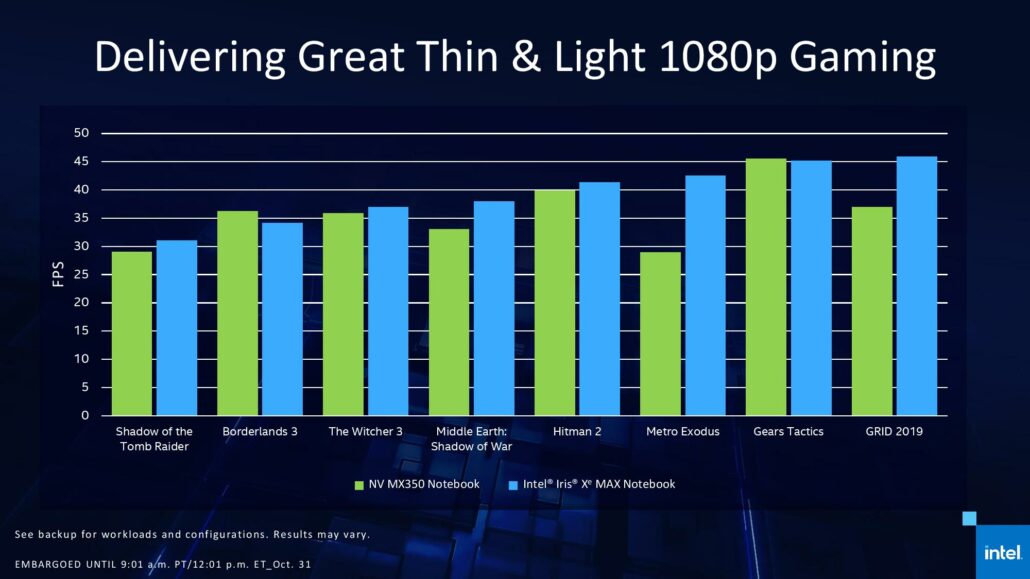
The Intel Iris Xe MAX notebook easily beats out NVIDIA’s MX350 in 8/10 scenarios given in this benchmark. I also appreciate the fact that it looks like Intel has tried not to cherry-pick benchmarks and actually give a few examples where the NVIDIA MX350 beats the Intel Xe MAX solution like Borderlands 3 and Gears Tactics. However, Intel Iris Xe MAX GPU is seen to offer more consistent performance throughout the gaming tiers and absolutely destroys the MX350 in some heavy AAA titles like Metro Exodus. Since it can achieve 30+ fps on most AAA titles on low-medium setting, I would say this is the first entry-level gaming solution from Intel in years.
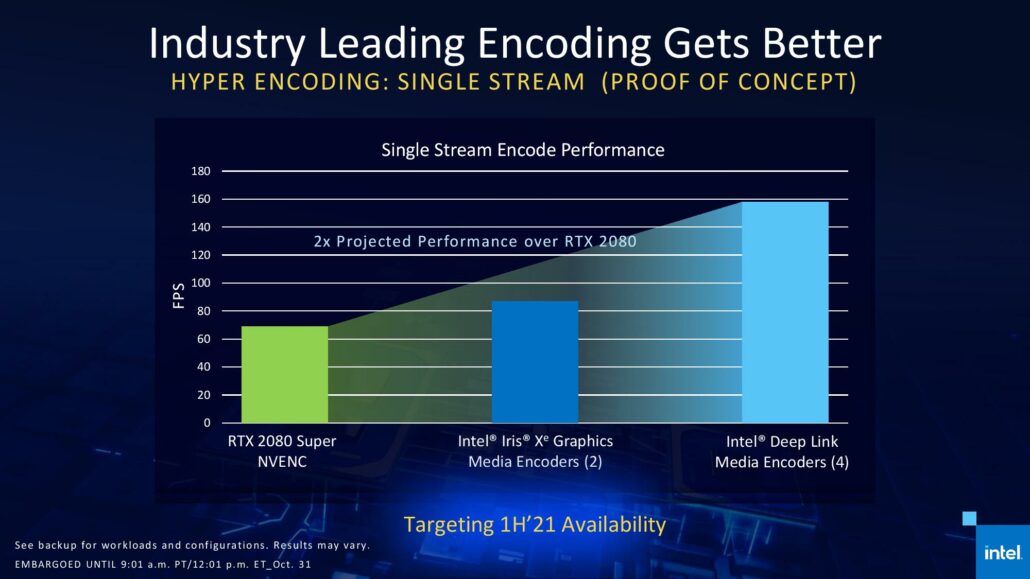
AI and productivity-related workloads on the other hand are a completely different scenario. Since Intel’s Iris Xe MAX GPU already features DL Boost and on top of that Deep Link allows the notebook to distribute AI workloads to all three devices, an Xe MAX equipped notebook absolutely decimates its weight class and even hands out a solid beating to NVIDIA’s RTX 2080 flagship mobility GPU. In encoding, Intel’s benchmarks found the Intel Deep Link-based solution to be a resounding 78% faster than an NVIDIA RTX 2080!

Intel’s Deep Link technology is a nerd’s wet dream. The complete utilization of available resources with almost no wastage is exactly how things should be configured and embodies the ‘to-the-metal’ philosophy that has made consoles so powerful in the recent past. The best part is, we might actually see Deep Link enabled in some gaming applications since Intel was tightlipped but mentioned that they are working on adding more applications to the platform.
The Dynamic Power sharing also allows the company to fine tune performance (similar to AMD) in TDP constrained scenarios. Intel® Iris® Xe MAX graphics are available for Acer Swift 3x, Asus VivoBook Flip TP470 and Dell Inspiron 15 7000 2 in 1 starting today. These are the first devices to leverage 11th Gen Intel Core mobile processors, Intel Iris Xe MAX graphics and Intel Deep Link technology.